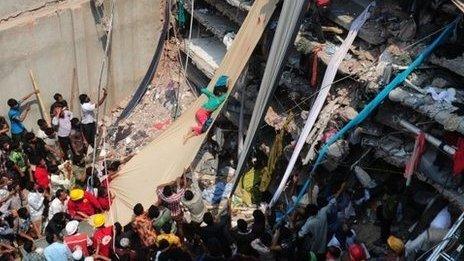Rana Plaza collapse: Primark extends payments to victims
- Published
Paul Lister, Associated British Foods: 'We would welcome increases in the minimum wage"
Discount clothes chain Primark has said it will extend compensation for victims and their families affected by the Rana Plaza factory collapse in Bangladesh.
Primark told the BBC it would continue to pay the wages of those affected for another three months.
The collapse, which happened in April, killed more than 1,100 people.
International firms have since faced criticism for lack of collective action to improve the working conditions in Bangladeshi garment factories.
In addition to the death toll, more than 2,500 were injured in the disaster.
Last month, the global trade union IndustriALL called a meeting of some of the world's largest retailers in Geneva to discuss a long-term compensation fund of $74.6m (£47.2m) for the workers injured in the disaster, and the families of those who died.
However, only nine of the 23 brands being produced at the Rana Plaza factory were represented at the meeting. Key absentees included Wal-Mart and Benetton and the retailers failed to reach a deal on a compensation fund for victims.
Calls for reform
The garments manufacturing sector is a key driver of Bangladesh's economy.
However, a series of incidents has raised concerns over the working conditions in some of the factories in the country.
Last November, 112 workers were killed in a fire at another clothes factory in the same area, and nine died in a blaze earlier this month at a garment manufacturer, again near the Bangladeshi capital Dhaka.
In September, the BBC's Panorama programme reported that Bangladeshi garment workers had been locked in on 19-hour shifts.
As a result, there have been calls to improve the conditions at the units, prompting some action from various stakeholders.
But earlier this week, Bangladesh and the International Labour Organisation (ILO) agreed to launch a $24m initiative to improve the conditions of garment workers.
In May, many international retailers agreed to a new code of practice regarding safety inspections for factories.
'Looked in horror'
At the time of the IndustriALL meeting, Primark said that it would continue to pay wages to those affected by the fire and building collapse for another three months, having paid for the previous three.
The new announcement takes the total to nine months.
In his first interview with the BBC, Paul Lister, head of corporate governance at Primark's parent company, Associated British Foods, said that "a lot has been done" since the fire to improve standards, and that the events of April were a "huge tragedy".
"We looked on in horror. We knew our clothes were in the building, and we accepted responsibility," he said.

Volunteers used the fabrics from the factory to try to rescue workers from the collapsed building
When asked what he thought about other retailers not participating in compensation schemes, he said there was "still a long way to go" and that it was "time for others to step up".
Mr Lister added that Primark would also welcome a rise in the minimum wage for garment workers.
The minimum wage for a worker in such a factory is currently around 3,000 Bangladeshi taka a month (about £24; $40).
'Ethically sourced'
When shown a Primark T-shirt costing just £2.50 and asked whether selling cheap clothes meant the people making them had to endure low pay and long hours, he said this was not the case, and that Primark's clothes were "ethically sourced".
Mr Lister added that Primark and other low-price retailers often shared factory facilities and manufacturing bases with much more expensive brands.
Reshma Begum survived for 17 days under rubble: "I have nightmares I am trapped"
"We share 95% of our factories with other high street retailers. We share factories with Bond Street retailers. It's the same conditions, the same workforce, the same pay."
"We know the factory where that T-shirt is made, we will have inspected that factory... we often sit outside factories to make sure the timesheets are correct."
Mr Lister insisted that although a worker in a Bangladeshi factory would earn around 10p an hour, the garment industry had a positive impact on the country.
"There are four million employed [in the textile industry], 80% of Bangladeshi exports are clothes. It is a way to alleviate poverty. It is a force for good."
- Published17 September 2013
- Published13 September 2013
- Published11 September 2013
- Published22 October 2013
- Published24 July 2013